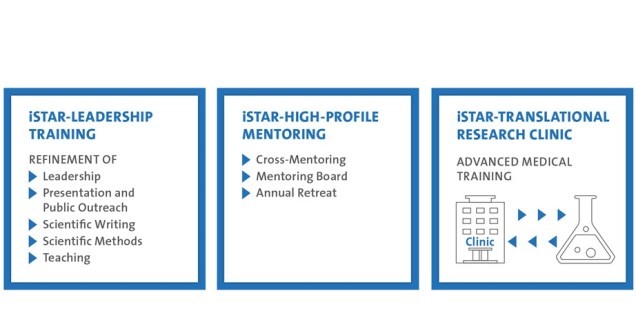3-Step iSTAR-Curriculum
The aim of the iSTAR program, which spans a period of 6 years for the participants, is to create a support, training, and interaction structure for ACS in order to enable them to target inadequate inflammatory responses across different organs and diseases using a translational research approach.
Our aim is to allow UKE iSTAR participants to use their great potential to go beyond tenure track positions and to be competitive for leading positions in academia and industry. Thus, we will implement three structured complementary modules, which can be tailored to the individual needs of each UKE iSTAR participant:
-
iSTAR-Leadership Training
The iSTAR-Leadership Training will be tailored to the specific needs of each ACS. This training includes five key modules aiming to refine:
A) Leadership (team leading, time management),
B) Presentation and Public Outreach (scientific talks, teaching, grant and job presentations/ interviews),
C) Scientific writing (grants and publications),
D) Scientific Methods (Bioinformatics, Deep Learning, Systems Biology/Immunology), and
E) Teaching (iSTAR participants will participate in teaching methodology courses for university lecturing, e.g. Dozententraining at the UKE) and will be part of teaching in the medical student curriculum.
Finally, UKE iSTAR participants will supervise iPRIME students, which is the graduate school for medical students, and also mentor Junior Clinician Scientists of the general UKE program.
As part of all five modules, we will offer general training for the group of UKE iSTAR participants. More importantly, there will be individual one-to-one coaching, which will be given by external coaches with whom we have worked very successfully in the past and by internal and external mentors as needed. The key needs will be identified and discussed at the beginning of the program and reviewed on a yearly basis with the mentoring team of each participant. On the basis of this discussion, each participant can focus on a selected subset of training opportunities.
-
iSTAR-high-Profile Mentoring
We will establish an iSTAR-high-Profile Mentoring program. Each UKE iSTAR participant will have two mentors. At least one of them will be a clinician scientist. We are particularly interested in establishing cross-mentoring, i.e. one mentor will be a successful Clinician Scientist and the second one, a basic scientist.
Furthermore, we will establish an additional Mentoring Board. This board consists of five high-profile international scientists and five leading scientists from Industry.
-
iSTAR-Translational Research Clinic
We will establish an iSTAR-Translational Research Clinic in which the clinician scientists treat inpatients and outpatients with autoimmune and chronic inflammatory diseases and infections and at the same time, recruit these patients into translational studies.
In order to do so, we have created Clinical Teams, which focus on specific diseases (e.g. infections, inflammatory diseases in the brain, heart and vasculature, intestine, kidney, and liver). Each team is led by a tenured clinician scientist Professor, who will also serve as a role model for the participant.
Furthermore, each team is composed of clinical residents, clinical fellows, clinical specialists, and Junior Clinician Scientists. The latter group is critical to foster peer mentoring between Junior and Advanced Clinician Scientists. Of note, we will establish a central outpatient unit for all patients with inflammatory diseases and infections. This unit will include a central Interaction Room for iSTAR participants, fostering the interaction and collaborations. This is critical to achieve our major aim, which is to target inadequate inflammatory responses across different organs and diseases.
Furthermore, the iSTAR participants will receive advanced and individualized medical training within the team. This includes specific diagnostics and therapeutic procedures, as well as access to courses and classes aimed at the focus of the participant.
